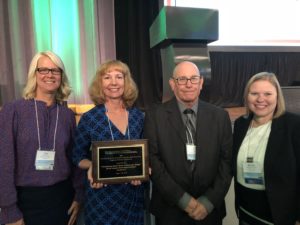2018 National Awards for Innovative Substance Abuse Prevention Programs, Practices and Policies
2018 AWARD WINNER
Combatting Retail Sales of Synthetic Drugs, North Coastal Prevention Coalition, California

Tracy Flinn (NASADAD), Erica Leary (NCPC), John Byrom (NCPC), Michelle Nienhius (NPN-South Carolina)
The North Coastal Prevention Coalition (NCPC) has facilitated community-level prevention strategies in the cities of Carlsbad, Oceanside, and Vista in North Coastal San Diego County since 1993. Coalition efforts focus on environmental prevention strategies in order to change the community norms, access, and availability that contribute to substance use problems.
The application detailed NCPC’s efforts to reduce the retail sales of synthetic drugs, particularly those designed to mimic marijuana, like K2 and spice. NCPC first learned about synthetic drugs like spice and bath salts back in 2009, when staff at an afterschool program explained that their students were using it as a ‘legal’ way to get high. High school kids were buying spice at local gas stations and convenience stores and were selling it to middle school students.
NCPC embarked on a multi-year effort to address this new and emerging substance, and worked with partners at the local, regional, state and federal level. Initial approaches began with increasing public awareness and partnering with local law enforcement agencies to urge local retail outlets to stop selling these dangerous products. Youth advocates were trained to conduct store assessments and purchase attempts and make follow up visits. Though these efforts had some success in reducing availability from corporate stores, other retailers like independent markets, liquor stores, and head shops continued to profit off these products since the laws and enforcement could not keep up.
After California law changed in January 2012 to prohibit the sale of synthetic cannabinoid compounds, NCPC worked with law enforcement to put retailers on notice that these products were illegal. By June 2012, most of the stores came into compliance. But two headshops and two smoke-shops in Oceanside did not comply.
After a string of medical calls for service in downtown Oceanside in 2015, the business association, law enforcement, the City Attorney, and NCPC collaborated to craft a local ordinance that would give additional tools to crack down on illegal sales. Rather than focusing on a class of chemical compounds, the local ordinance included pricing and packaging, and attached a $500 fine per package for violators. This was a critical step to eliminate these products from local stores and resulted in a dramatic decline in calls for service – from 181 between January 2013 and April 2016 (when the ordinance was adopted) to 9 from May 2016 to August 2017.